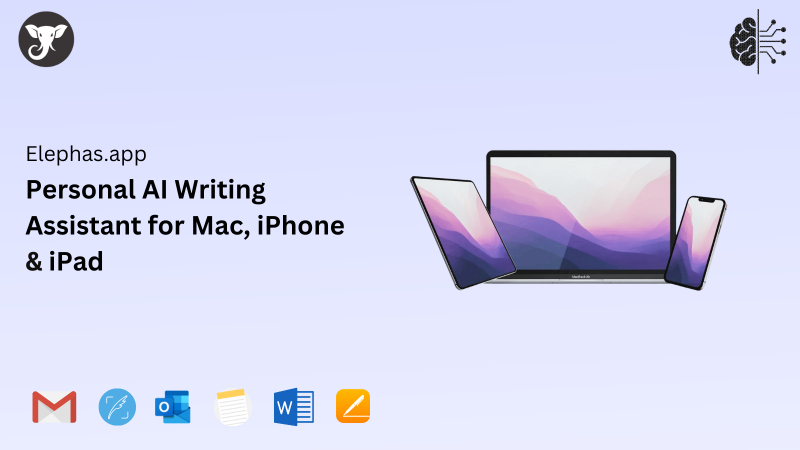Revolutionizing Email Writing with AI: How AI Email Writers are Changing the Game
Email is an essential communication tool in business today, and email writing is a critical skill for professionals across industries. However, crafting an effective email can be time-consuming and challenging, and many individuals and organizations struggle with producing consistent, high-quality emails.
This is where AI email writers come in, providing a new solution to this ongoing challenge.
In this article, we will explore the emergence of AI email writers, how they work, their benefits, and their real-world applications.
Contents
- The Emergence of AI Email Writers
- How AI Email Writers Work
- Natural Language Processing and Generation
- Machine Learning and Personalization
- Integrations with Email Platforms
- Benefits of Using AI Email Writers
- Improved Efficiency and Time Savings
- Enhanced Creativity and Content Quality
- Personalization and Targeted Messaging
- Reduced Human Error and Consistency
- Real-World Applications of AI Email Writers
- Marketing and Sales Emails
- Customer Support and Service
- Internal Communications and Collaboration
- Newsletters and Content Creation
- Conclusion
The Emergence of AI Email Writers
Artificial intelligence (AI) has been making waves across industries, and writing is no exception. As technology advances and AI becomes more sophisticated, it has become increasingly capable of creating written content that is nearly indistinguishable from human writing. In recent years, AI email writers have emerged as a solution to the challenges of email writing, and many companies are starting to take notice.
A Brief History of AI in Writing
AI writing has a relatively short history, but it has made significant progress in recent years. The earliest attempts at AI writing were simple programs that generated basic sentences or phrases. However, with the advent of natural language processing and machine learning, AI writing has become more sophisticated, and it can now produce full paragraphs and even entire articles.
One of the key breakthroughs in AI writing was the development of neural networks. These are computer systems that are designed to mimic the structure and function of the human brain. By using neural networks, AI writers can learn from examples of human writing and use that knowledge to generate new content that is similar in style and tone.
Key players in the AI Email Writing Market
Several companies have emerged as significant players in the AI email writing market, offering a variety of solutions with different features and capabilities.
Some of the most prominent players include Grammarly, Phrasee and Elephas.
These companies use different approaches to AI writing, but they all aim to help individuals and organizations write better emails.
Grammarly, for example, is a popular tool that uses AI to analyze the grammar, spelling, and tone of emails and other written content. It can suggest changes and improvements to make the writing more effective and engaging. But when it comes to email writing, Grammarly lacks personalization and context awareness.
Phrasee is another AI email writer that uses natural language generation to create email subject lines and body text. It analyzes data on previous email campaigns and uses that information to generate new content that is likely to be effective.
Elephas is the perfect tool for writing emails, especially if you're a Mac user.

There are 2 ways you can use Elephas AI to write emails for you.
Context Aware Email Replies
It basically lets you generate smart replies based on the current thread or conversation. Right on your Mac.
It works on Gmail, Outlook web, and Apple Mail for now, working on more integrations as I write this.
Here's how it looks like in action -
Reply with "Super Brain"
Another related feature is the "Super Brain".
Where you load your own documents into a "brain" and then use them to automatically reply to emails.
Here's how that works -
Overall, the emergence of AI email writers has the potential to revolutionize the way we communicate through email.
As these technologies continue to improve, we can expect to see more sophisticated and effective AI writing tools that will make our written communications more efficient and impactful.
How AI Email Writers Work
AI email writers are revolutionizing the way we communicate through email. They use several technologies and techniques to create effective emails, including natural language processing and generation, machine learning, and email platform integrations.
Natural Language Processing and Generation
Natural language processing (NLP) is a technology that allows computers to analyze and understand human language. In the case of AI email writers, this means that the program can read and interpret the content of an email and use that information to generate new text that is relevant and on-topic.
This technology is particularly useful for businesses that need to send out large volumes of emails to customers or clients. With AI email writers, companies can now create personalized emails that sound like they were written by a human, but are actually generated by a computer program.
For example, an AI email writer might use NLP to analyze a customer's previous purchase history and use that information to create a personalized email recommending new products that the customer might be interested in.
Natural language generation (NLG) is another AI technology that allows computers to create human-like text. In the case of AI email writers, NLG can be used to generate entire emails or specific sections of an email, such as a personalized greeting or a closing statement.
This technology is particularly useful for businesses that need to send out large volumes of emails to customers or clients. With AI email writers, companies can now create personalized emails that sound like they were written by a human, but are actually generated by a computer program.
For example, an AI email writer might use NLG to generate a personalized greeting that includes the recipient's name and other relevant information, such as their recent purchase history.
Machine Learning and Personalization
AI email writers can also use machine learning to learn from past emails and improve their writing over time. This technology allows the program to analyze patterns in language and behavior and personalize email content to the specific recipient.
For example, an AI email writer might use machine learning to recognize that a particular recipient prefers direct language and adjust the email's tone and content accordingly. This level of personalization can help businesses build stronger relationships with their customers and increase the effectiveness of their email marketing campaigns.
Integrations with Email Platforms
Many AI email writers integrate with email platforms such as Gmail or Outlook, allowing users to write and send emails directly from the program. This integration can streamline the email writing process and eliminate the need to switch back and forth between applications.
Additionally, some AI email writers can automatically analyze the performance of emails and provide insights on how to improve future emails. This can help businesses save time and resources by optimizing their email campaigns without the need for manual analysis.
In conclusion, AI email writers are a powerful tool for businesses looking to improve their email marketing campaigns. By using natural language processing and generation, machine learning, and email platform integrations, AI email writers can create personalized and effective emails at scale, helping businesses build stronger relationships with their customers and increase their bottom line.
Benefits of Using AI Email Writers
AI email writers offer several benefits over traditional email writing methods, including improved efficiency and time savings, enhanced creativity and content quality, personalization and targeted messaging, and reduced human error and consistency. However, these benefits are just the beginning of what AI email writers can offer.
Improved Efficiency and Time Savings
AI email writers can generate emails much faster than humans can, freeing up time for other tasks. Additionally, AI writers can create multiple emails simultaneously, further increasing efficiency. This means that businesses can send more emails in less time, leading to increased productivity and revenue.
For example, imagine a company that needs to send out a large number of promotional emails for a new product launch. With traditional email writing methods, it could take days or even weeks to write and send all of the emails. However, with an AI email writer, the company could generate all of the emails in a matter of hours, allowing them to focus on other important tasks.
Enhanced Creativity and Content Quality
AI email writers can offer a fresh perspective and generate unique content that humans may not have thought of. Furthermore, because they use machine learning to learn from past emails, AI writers can continuously improve on the quality of their writing over time.
For example, an AI email writer could analyze the performance of past emails and use that information to generate new and improved content. This could include using different subject lines, changing the tone of the email, or even rephrasing certain sentences to make them more engaging.
Personalization and Targeted Messaging
AI email writers can analyze recipient behavior and preferences to generate personalized emails. This personalization can improve engagement and response rates, ultimately leading to more successful email campaigns.
For example, an AI email writer could analyze a recipient's past interactions with the company, such as their purchase history or website activity, to generate a personalized email that speaks directly to their interests and needs. This targeted messaging can help build stronger relationships with customers and increase brand loyalty.
Reduced Human Error and Consistency
Because AI email writers are programmed to follow specific guidelines and grammar rules, they can help eliminate errors and inconsistencies commonly found in human-written emails. This consistency can reinforce a brand's messaging and maintain a professional image.
For example, an AI email writer could ensure that all emails sent by a company use the same tone, style, and formatting. This consistency can help build brand recognition and trust with customers.
In conclusion, AI email writers offer a range of benefits that can help businesses save time, improve content quality, and build stronger relationships with customers. As AI technology continues to evolve, we can expect to see even more innovative email writing solutions in the future.
Real-World Applications of AI Email Writers
AI email writers have various real-world applications, including marketing and sales emails, customer support and service, internal communications, and collaboration, and newsletters and content creation.
Marketing and Sales Emails
AI email writers can help marketers create and send targeted email campaigns, using personalized language and analysis of past engagement to increase conversions and sales.
Customer Support and Service
AI email writers can provide quick and automated responses to common customer inquiries, improving response times and freeing up customer support agents' time for more complex issues.
Internal Communications and Collaboration
AI email writers can help organizations communicate effectively internally, allowing teams to quickly disseminate information and collaborate effectively.
Newsletters and Content Creation
AI email writers can generate high-quality content for newsletters and other email campaigns, using machine learning to improve their writing over time and produce content that resonates with the target audience.
Conclusion
Technology continues to transform the way we work, and AI email writers are a prime example of this transformation. With their ability to generate efficient, high-quality, and personalized emails, AI email writers are changing the email game, revolutionizing how we communicate in the workplace.
Our recommendation?
Try out Elephas for FREE for 30 days and upgrade your AI Email writing game.

Further Reading:
Write More in Less Time: A Hybrid Approach with AI Writing Assistants
How to use OpenAI to improve your workflow and productivity as a writer
Comments
Your comment has been submitted